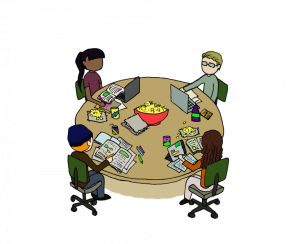 Revising for exams is a task that most students dread. It’s that daunting time when you suddenly realise that there is a lot more information to learn than days left to learn it all. Often, many other events are going on in your life at the same time, so revision gets left until the last minute, which only makes things worse. As your stress levels build, you may find it difficult to sleep or lack the energy to exercise. Ultimately, you need to monitor your own stress levels and take control over when and how your revision gets done.
Revising for exams is a task that most students dread. It’s that daunting time when you suddenly realise that there is a lot more information to learn than days left to learn it all. Often, many other events are going on in your life at the same time, so revision gets left until the last minute, which only makes things worse. As your stress levels build, you may find it difficult to sleep or lack the energy to exercise. Ultimately, you need to monitor your own stress levels and take control over when and how your revision gets done.
If there is one piece of advice to give, plan ahead. It’s never too early to start getting organised for assessment. With a clear plan for each of the subjects you’re studying, you will have more confidence and a sense of purpose. You’ll know what the end goal is, how long you have to get there, and all the steps needed on the way to achieving success.
For school students, you’ll probably have some practice exams coming up during Term Three. These exams are often shorter in duration than the final exams because you haven’t yet covered all the topics for the year’s work. Find out from your teachers exactly what will be examined in the practice exams. Then find out when these exams are and make a plan going backwards from exam week to now. Consider using a planner template to plan when you will revise each subject. You can also add in other commitments such as sports practice, hobbies and leadership roles. You may have other deadlines such as internal assessments, practicals and sports competitions coming up, all of which should be added to your planner.
Identify when you have time each day to study for the exams. It might be a slot between 4pm and 6pm each week day, or a Saturday afternoon. For each subject you study at school, allow at least three hours of study time per week. As exams get closer, increase the number of hours per week. Remember to include breaks, sport, relaxation and fun in your schedule. Avoid too much computer time, especially just before bed. If you are lacking motivation, think about creating a study group with a few friends. Getting together for a focused session for one hour might be more worthwhile than sitting alone at home all evening getting distracted by social media. You could even teach each other part of a topic. Most of all, keep eating well, get plenty of sleep and exercise, and monitor your stress levels.
Revision can be broken down into four phases:
- You’ll need to do an initial reading of the content of a topic. After reading, try writing a summary (from memory) of what you have read. Organise the summary in a way that works for you, such as in mind maps, wall charts, flash cards, voice recordings or flow charts. Go back to check that your original notes match your summary – add in any forgotten information.
- Next you should read your summary over and over again for the next few days. Test your knowledge by forcing yourself to say it out loud, make links between parts, do quizzes, draw diagrams, write paragraphs or write definitions. Stick notes onto the wall of your room so that you see them daily. Your aim is to move the information into your long term memory.
- Monitor your ability to recall/understand certain aspects over others. Which bits do you keep forgetting? Try another way to remember those things. Keep reading over your notes and summaries. Test yourself again. Ask a friend/relative to help with testing you. Do more quizzes or multi-choice tests … try Kahoot online.
- Finally, practise answering past exam questions. NZQA subject resources can be found here. Become familiar with the way exam questions are worded for each subject. Be aware of which topics have been asked in the last three years of exams. If parts of questions such as graphics or photos are missing from the website versions of exams, ask your teachers if they have a paper version that you can photocopy. Mark your work using online assessment schedules. Give your work to your teacher for feedback and ask if you can spend some time going over their suggestions after class.
 At this point, forming a small study group would be worthwhile. You could all attempt a past exam paper, then meet up to discuss your answers and mark each other’s work. Talking about the parts you struggled to answer will help your understanding greatly. Find out how your friends are doing their revision. Swap ideas and share your knowledge. Keep it fun!
At this point, forming a small study group would be worthwhile. You could all attempt a past exam paper, then meet up to discuss your answers and mark each other’s work. Talking about the parts you struggled to answer will help your understanding greatly. Find out how your friends are doing their revision. Swap ideas and share your knowledge. Keep it fun!
Finally, always put your phone in another room when you are studying. It is just a distraction. Use it as a reward for an hour’s solid study when you take a break. Good luck with your revision!
Links:
TKI study and Exam techniques
https://assessment.tki.org.nz/Assessment-tools-resources/Study-and-exam-techniques
NZQA Subject Resources
https://www.nzqa.govt.nz/ncea/subjects/
Phases of revision (Massey University, NZ):
https://owll.massey.ac.nz/tests-and-exams/phases-of-revision.php
Revision tips
https://www.theguardian.com/education/2013/apr/24/revision-advice-students
https://www.theguardian.com/education/2018/may/17/struggling-revision-exams-cramming-experts





Recent Comments